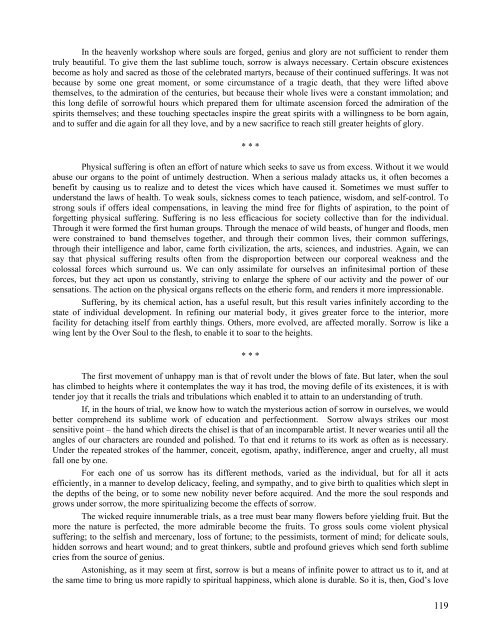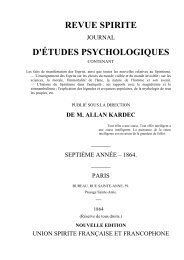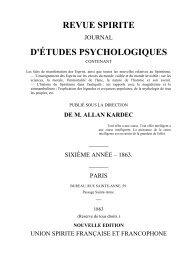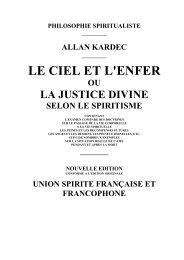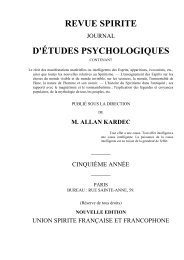PDF version - Geae
PDF version - Geae
PDF version - Geae
Create successful ePaper yourself
Turn your PDF publications into a flip-book with our unique Google optimized e-Paper software.
In the heavenly workshop where souls are forged, genius and glory are not sufficient to render them<br />
truly beautiful. To give them the last sublime touch, sorrow is always necessary. Certain obscure existences<br />
become as holy and sacred as those of the celebrated martyrs, because of their continued sufferings. It was not<br />
because by some one great moment, or some circumstance of a tragic death, that they were lifted above<br />
themselves, to the admiration of the centuries, but because their whole lives were a constant immolation; and<br />
this long defile of sorrowful hours which prepared them for ultimate ascension forced the admiration of the<br />
spirits themselves; and these touching spectacles inspire the great spirits with a willingness to be born again,<br />
and to suffer and die again for all they love, and by a new sacrifice to reach still greater heights of glory.<br />
* * *<br />
Physical suffering is often an effort of nature which seeks to save us from excess. Without it we would<br />
abuse our organs to the point of untimely destruction. When a serious malady attacks us, it often becomes a<br />
benefit by causing us to realize and to detest the vices which have caused it. Sometimes we must suffer to<br />
understand the laws of health. To weak souls, sickness comes to teach patience, wisdom, and self-control. To<br />
strong souls if offers ideal compensations, in leaving the mind free for flights of aspiration, to the point of<br />
forgetting physical suffering. Suffering is no less efficacious for society collective than for the individual.<br />
Through it were formed the first human groups. Through the menace of wild beasts, of hunger and floods, men<br />
were constrained to band themselves together, and through their common lives, their common sufferings,<br />
through their intelligence and labor, came forth civilization, the arts, sciences, and industries. Again, we can<br />
say that physical suffering results often from the disproportion between our corporeal weakness and the<br />
colossal forces which surround us. We can only assimilate for ourselves an infinitesimal portion of these<br />
forces, but they act upon us constantly, striving to enlarge the sphere of our activity and the power of our<br />
sensations. The action on the physical organs reflects on the etheric form, and renders it more impressionable.<br />
Suffering, by its chemical action, has a useful result, but this result varies infinitely according to the<br />
state of individual development. In refining our material body, it gives greater force to the interior, more<br />
facility for detaching itself from earthly things. Others, more evolved, are affected morally. Sorrow is like a<br />
wing lent by the Over Soul to the flesh, to enable it to soar to the heights.<br />
* * *<br />
The first movement of unhappy man is that of revolt under the blows of fate. But later, when the soul<br />
has climbed to heights where it contemplates the way it has trod, the moving defile of its existences, it is with<br />
tender joy that it recalls the trials and tribulations which enabled it to attain to an understanding of truth.<br />
If, in the hours of trial, we know how to watch the mysterious action of sorrow in ourselves, we would<br />
better comprehend its sublime work of education and perfectionment. Sorrow always strikes our most<br />
sensitive point – the hand which directs the chisel is that of an incomparable artist. It never wearies until all the<br />
angles of our characters are rounded and polished. To that end it returns to its work as often as is necessary.<br />
Under the repeated strokes of the hammer, conceit, egotism, apathy, indifference, anger and cruelty, all must<br />
fall one by one.<br />
For each one of us sorrow has its different methods, varied as the individual, but for all it acts<br />
efficiently, in a manner to develop delicacy, feeling, and sympathy, and to give birth to qualities which slept in<br />
the depths of the being, or to some new nobility never before acquired. And the more the soul responds and<br />
grows under sorrow, the more spiritualizing become the effects of sorrow.<br />
The wicked require innumerable trials, as a tree must bear many flowers before yielding fruit. But the<br />
more the nature is perfected, the more admirable become the fruits. To gross souls come violent physical<br />
suffering; to the selfish and mercenary, loss of fortune; to the pessimists, torment of mind; for delicate souls,<br />
hidden sorrows and heart wound; and to great thinkers, subtle and profound grieves which send forth sublime<br />
cries from the source of genius.<br />
Astonishing, as it may seem at first, sorrow is but a means of infinite power to attract us to it, and at<br />
the same time to bring us more rapidly to spiritual happiness, which alone is durable. So it is, then, God’s love<br />
119


